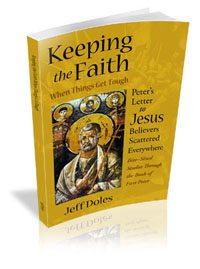The other day I ran a brief search on “law” and “prophets” in the New Testament for an overview of how they relate to Jesus. Used together, “law” and “prophets” indicates the totality of the Hebrew Scriptures. So here is a short rundown on how the New Testament understands the relationship between Jesus and the Old Testament.
The Kingdom of God Fulfills the Law and the Prophets
Assuredly, I say to you, among those born of women there has not risen one greater than John the Baptist; but he who is least in the kingdom of heaven is greater than he. And from the days of John the Baptist until now the kingdom of heaven suffers violence, and the violent take it by force. For all the prophets and the law prophesied until John. And if you are willing to receive it, he is Elijah who is to come. (Matthew 11:11-14)
The law and the prophets were until John. Since that time the kingdom of God has been preached, and everyone is pressing into it. (Luke 16:16)
The Law and the Prophets led up to the days of John the Baptist, who came in the spirit and power of Elijah. He was the forerunner who prepared the way for Messiah, preaching a baptism of repentance. Jesus, after He was baptized by John and tested in the wilderness, began His ministry preaching the “gospel of the kingdom of God,” saying, “The time is fulfilled, and the kingdom of God is at hand. Repent, and believe in the gospel” (Mark 1:14-15). Since that time, the kingdom of God has been
forcefully advancing, and people have been pressing into it,
forcefully laying hold of it by faith.
Jesus the Messiah Fulfills the Law and the Prophets
In the Sermon on the Mount (which I call
The Sermon of Heaven on Earth), Jesus said, “Do not think that I came to destroy the Law or the Prophets. I did not come to destroy but to fulfill” (Matthew 5:17). Jesus does not set aside the Law and the Prophets; He is the promised King and Messiah who assures us that everything God promised in the Law and the Prophets will be fulfilled. This is
the certainty of heaven on earth.
Then He said to them, “These are the words which I spoke to you while I was still with you, that all things must be fulfilled which were written in the Law of Moses and the Prophets and the Psalms concerning Me.” And He opened their understanding, that they might comprehend the Scriptures. Then He said to them, “Thus it is written, and thus it was necessary for the Christ to suffer and to rise from the dead the third day, and that repentance and remission of sins should be preached in His name to all nations, beginning at Jerusalem. (Luke 24:44-47)
Philip found Nathanael and said to him, “We have found Him of whom Moses in the law, and also the prophets, wrote — Jesus of Nazareth, the son of Joseph.” (John 1:45)
The disciples, sent out as apostles, testified of this throughout the world, making disciples of all nations, teaching them about King Jesus, the one who possesses all authority in heaven and on earth, and baptizing them in the name of the Father and of the Son and of the Holy Spirit (Matthew 28:18-20). They were not setting aside the Law and the Prophets but testifying of its fulfillment.
In the book of Acts, for example, we discover Paul’s
modus operandi, when he announced the good news in the synagogue at Antioch: “And after the reading of the Law and the Prophets, the rulers of the synagogue sent to them, saying, ‘Men and brethren, if you have any word of exhortation for the people, say on’” (Acts 13:15). Being invited to teach on the Law and the Prophets, Paul stood up and began preaching how Jesus is the fulfillment of the Hebrew Scriptures and what God was doing through Israel (Acts 13:16-41). Many devout Jews, as well as Gentile proselytes to the Hebrew faith, believed the good news he brought (vv. 42-44).
On another occasion, when Paul was accused of profaning the temple and stirring up sedition among the Jews, he made his case before the Roman procurator, Felix. He denied the charges and said, “But this I confess to you, that according to the Way which they call a sect, so I worship the God of my fathers, believing all things which are written in the Law and in the Prophets” (Acts 24:14). His preaching was not an incitement to insurrection among the Jews but a call for them to believe the Torah and the Hebrew Prophets concerning Messiah.
At the end of the book of Acts, we find Paul at Rome and under house arrest, doing what he had always done: preaching about Jesus and how the Law and the Prophets and the kingdom of God, all come together in Him. “So when they had appointed him a day, many came to him at his lodging, to whom he explained and solemnly testified of the kingdom of God, persuading them concerning Jesus from both the Law of Moses and the Prophets, from morning till evening” (Acts 28:23).
Then, in his letter to the believers at Rome, Paul demonstrates how the righteousness of God is revealed apart from the Law, through faith in the Messiah, Jesus — and the Law and the Prophets testify to this! “But now the righteousness of God apart from the law is revealed, being witnessed by the Law and the Prophets, even the righteousness of God, through faith in Jesus Christ, to all and on all who believe” (Romans 3:21-22).
The Commandment of Love Fulfills the Law and the Prophets
The Law and the Prophets are fulfilled in King Jesus the Messiah, and in the commandment He brings, which is to love one another. For example, in the Sermon on the Mount, He said, “Therefore, whatever you want men to do to you, do also to them, for this is the Law and the Prophets” (Matthew 7:12). There is a story told of Rabbi Hillel (b. about 110 BC d. about AD 10), who said something very similar. When a scoffer came and asked the rabbi to teach him the Torah while standing on one foot, he answered, “That which is hateful to you, do not do to your fellow. That is the whole Torah; the rest is the explanation; go and learn.”
One day a Pharisee who was particularly skilled in the Law of Moses came to test Jesus: “Teacher, which is the great commandment in the Law? Jesus answered, “You shall love the Lord your God with all your heart, with all your soul, and with all your mind. This is the first and great commandment. And the second is like it: You shall love your neighbor as yourself. On these two commandments hang all the Law and the Prophets” (Matthew 22:37-40).
On the night of the Last Supper, as He was preparing the disciples for what was about to happen, Jesus said, “A new commandment I give to you, that you love one another; as I have loved you, that you also love one another. By this all will know that you are My disciples, if you have love for one another” (John 13:34-35). “This is My commandment, that you love one another as I have loved you” (John 15:12).
A new time had come, the time of God’s kingdom. A new covenant had come, instituted in the blood of Jesus (Luke 22:20). And with it, a new commandment — the commandment that fulfills all the Law: “Love one another ...” It is a commandment based on Jesus and His love, “… as I have loved you.” The apostles write of this commandment in their letters:
Owe no one anything except to love one another, for he who loves another has fulfilled the law. For the commandments, “You shall not commit adultery,” “You shall not murder,” “You shall not steal,” “You shall not bear false witness,” “You shall not covet,” and if there is any other commandment, are all summed up in this saying, namely, “You shall love your neighbor as yourself.” Love does no harm to a neighbor; therefore love is the fulfillment of the law. (Romans 13:8-10)
For all the law is fulfilled in one word, even in this: “You shall love your neighbor as yourself.” (Galatians 5:14)
And this is His commandment: that we should believe on the name of His Son Jesus Christ and love one another, as He gave us commandment. Now he who keeps His commandments abides in Him, and He in him. And by this we know that He abides in us, by the Spirit whom He has given us. (1 John 3:23-24)
The commandment that fulfills the Law and the Prophets is now possible for us because of Jesus, who fulfills the Law and the Prophets on our behalf. He has sent the Holy Spirit — baptized us with the Spirit — the same Spirit by whom He was anointed with power (Acts 10:38). Paul writes about the fruit of the Holy Spirit in us: love, joy, peace, patience, goodness, gentleness, meekness, faithfulness, self-control — in other words, the character of Jesus — something the Law of Moses could never produce in us (Galatians 5:22-23).
Everything God was doing with Old Testament Israel through the Law and the Prophets is fulfilled in the kingdom of God now present in the world, and in its king, Jesus the Messiah, and through His commandment, “Love one another as I have loved you.










